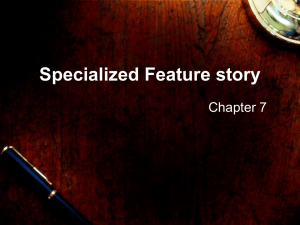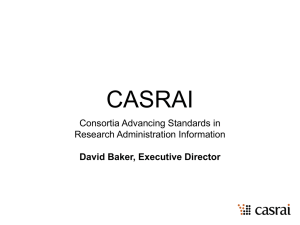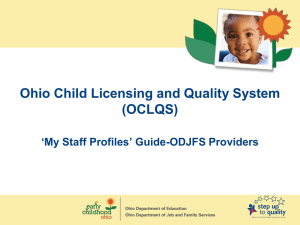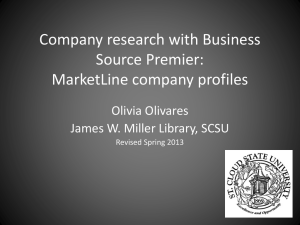Self Efficacy Scale - International Council of Associations for
advertisement
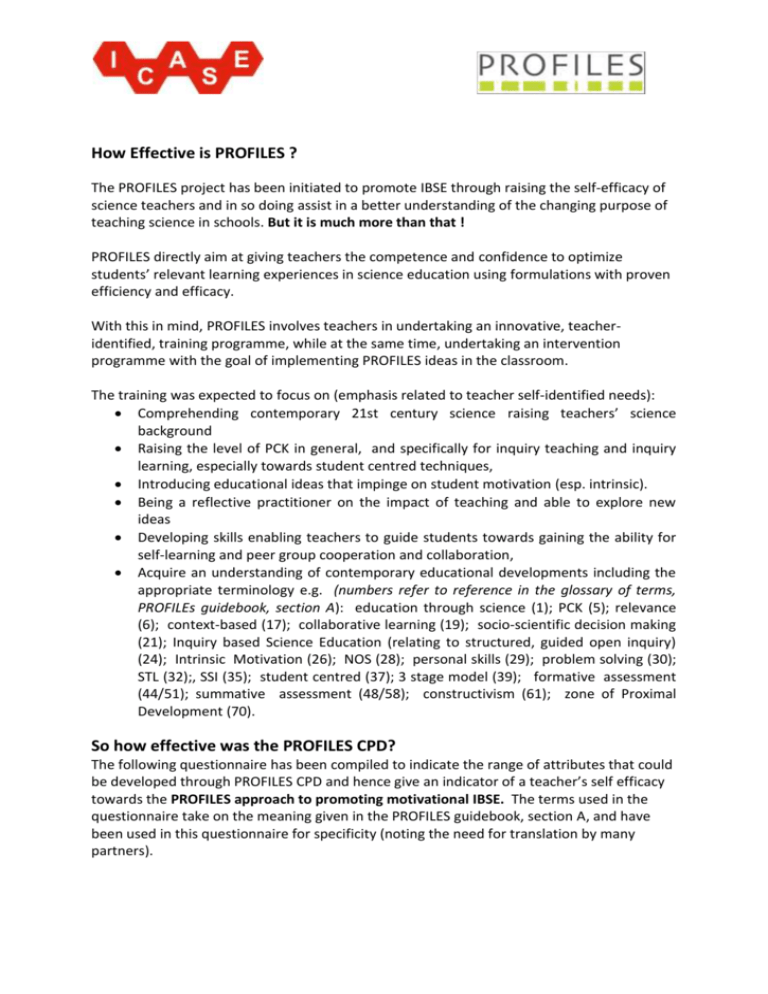
How Effective is PROFILES ? The PROFILES project has been initiated to promote IBSE through raising the self-efficacy of science teachers and in so doing assist in a better understanding of the changing purpose of teaching science in schools. But it is much more than that ! PROFILES directly aim at giving teachers the competence and confidence to optimize students’ relevant learning experiences in science education using formulations with proven efficiency and efficacy. With this in mind, PROFILES involves teachers in undertaking an innovative, teacheridentified, training programme, while at the same time, undertaking an intervention programme with the goal of implementing PROFILES ideas in the classroom. The training was expected to focus on (emphasis related to teacher self-identified needs): Comprehending contemporary 21st century science raising teachers’ science background Raising the level of PCK in general, and specifically for inquiry teaching and inquiry learning, especially towards student centred techniques, Introducing educational ideas that impinge on student motivation (esp. intrinsic). Being a reflective practitioner on the impact of teaching and able to explore new ideas Developing skills enabling teachers to guide students towards gaining the ability for self-learning and peer group cooperation and collaboration, Acquire an understanding of contemporary educational developments including the appropriate terminology e.g. (numbers refer to reference in the glossary of terms, PROFILEs guidebook, section A): education through science (1); PCK (5); relevance (6); context-based (17); collaborative learning (19); socio-scientific decision making (21); Inquiry based Science Education (relating to structured, guided open inquiry) (24); Intrinsic Motivation (26); NOS (28); personal skills (29); problem solving (30); STL (32);, SSI (35); student centred (37); 3 stage model (39); formative assessment (44/51); summative assessment (48/58); constructivism (61); zone of Proximal Development (70). So how effective was the PROFILES CPD? The following questionnaire has been compiled to indicate the range of attributes that could be developed through PROFILES CPD and hence give an indicator of a teacher’s self efficacy towards the PROFILES approach to promoting motivational IBSE. The terms used in the questionnaire take on the meaning given in the PROFILES guidebook, section A, and have been used in this questionnaire for specificity (noting the need for translation by many partners). Dear PROFILES teacher, After being involved in professional development under PROFILES, may we now determine your confidence, competence and the degree to which you feel comfortable using PROFILES modules and adopting the PROFILES approach. Please may we request that you place an ‘x’ in each of the boxes, corresponding to your feeling related to each of the 36 items. Post - PROFILES CDP Questionnaire 2. identify PROFILES module titles which students are likely to appreciate as being relevant to them? use PROFILES modules to promote inquiry-based learning by your students? appreciate whether a module initiates teaching from a socio-scientific, or purely a science perspective? 3. 4. 5 6. 7. 8. Efficacy in enacting Instructional Strategies based on PROFILES ideas identify the 3 stages on which teaching of a PROFILES module is based? incorporate learning outcomes in your PROFILES teaching related to a range of competencies i.e. knowledge, skills, attitudes and values. judge students’ comprehension during your teaching of what you are teaching? use a constructivist approach when teaching within science lessons? Efficacy in using Instructional Strategies related to stage 1 (of the 3 stage model) 9. predict whether the title of a PROFILES module is likely to be intrinsically motivational for students? 10. Use a student-centred approach when using a scenario as an introduction to a module? 11. utilise the scenario to identify students’ prior science knowledge? 12. make use of a relevant scenario to motivate students to feel they wish to learn the associated underlying science? 5-very high determine a suitable PROFILES module for a particular class? 4-quite high necessary 3- satisfactory 1. 2-very little Efficacy for identifying suitable PROFILES relevant modules 1-none In teaching, related to the PROFILES philosophy and approach, how proficient and confidence do you feel you are in being able to: Self- Efficacy level Efficacy in using Instructional Strategies related to stage 2 13. 14. 15. encourage students to think constructively within each student’s zone of proximal development? undertake inquiry teaching/learning associated with problem solving activities? develop student learning through guided inquiry and lead student learning towards the development of open inquiry skills? Efficacy in using Instructional Strategies related to stage 3 16. 17. 18. consolidate students’ scientific conceptual learning from stage 2 and guide students to transfer this learning to a new situation? engage students in reasoned socio-scientific discussions/debates/role playing etc? Involve students in justified decision-making and arriving at a class consensus? 19.. 20. 21. 22. Efficacy in enacting a desirable Classroom Learning Environment ensure the teaching is motivational for students? encourage supportive collaborative learning among your students? promote students’ communication/presentation abilities through science? match assessment (feedback) strategies to desired student learning outcomes? 23. 24. 25. 26. 27. 28. 29. Efficacy in implementing Student Involvement implement teaching strategies in your classroom recognised as student-centred? develop student’s creativity and the showing of initiative? adjust your teaching for maximising individual student understanding? guide students to engage in developing planning skills, carry out investigations, controlling variables, interpreting ability and drawing conclusions? Efficacy for inducing Student Gains get students to believe they can do well in science lessons? guide students to see personal value in their science learning? use a variety of formative and summative assessment strategies? Efficacy related to pedagogical content knowledge (PCK) To what extent do you feel you able to : 30. promote a meaningful perception of the nature of science? 31. interpret an educationally sound meaning for scientific and technological literacy for all? 32. implement ‘education through science’ as opposed to ‘science through education? 33. 34. 35. 36. Efficacy in undertaking Reflective Practices and Networking promote ways of stimulating student relevance of conceptual science learning? explain teaching approaches to inquiry-based learning geared to problem solving? suggest to others motivational ways of learning science? explain ways to enable students to reach consensus on justified decision making?

